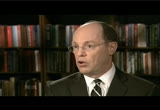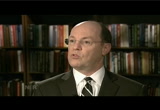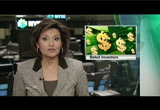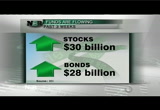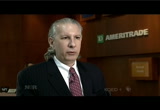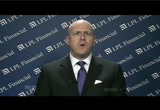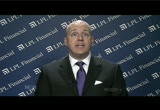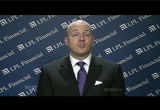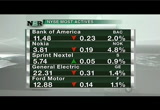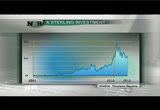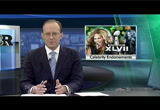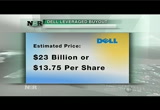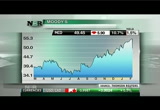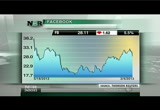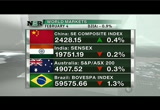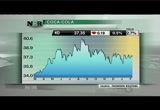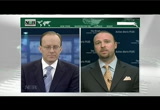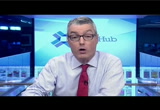tv Nightly Business Report PBS February 4, 2013 6:30pm-7:00pm PST
6:30 pm
captioning sponsored by wpbt >> this is n.b.r. >> susie: i'm susie gharib. ghosts of the financial crisis come back to haunt standard and poor's. the justice department is close to filing a lawsuit against the agency for wrongdoing in its ratings before the financial crisis. >> tom: i'm tom hudson. weakness in technology shares helps derail a five-week runnup on wall street, we look at stocks and the individual investor. >> susie: and michael dell could be taking the computer company that bears his name private, as soon as this week. a look at what going private means for investors. >> tom: that and more tonight on "n.b.r."! >> susie: entirely without legal merit, that's what standard and
6:31 pm
poor's is calling a potential lawsuit by the department of justice, for s&p's mortgage bond ratings ahead of the financial crisis. these charges come five years after the financial crisis and would be the first alleging illegal behavior by a major ratings agency. as darren gersh reports, s&p is fighting back. >> reporter: what took so long? that's the reaction from critics who have long argued standard and poor's gave a stamp of approval to flawed mortgage securities that helped bring on the financial crisis. >> it has to do with the unique role that ratings agencies play in the entire system of selling and distributing securities and the claims that they made about their role for which they were paid handsomely. >> reporter: in a statement, standard and poor's said the justice department's lawsuit had no legal or factual merit. saying:
6:32 pm
"it would disregard the central facts that s&p reviewed the same subprime mortgage data as the rest of the market-- including u.s. government officials who in 2007 publicly stated that problems in the subprime market appeared to be contained." >> reporter: s&p goes on to argue that the securities at issue in the justice department's case were reviewed by another ratings agency and received the same rating. s&p says it also began downgrading many mortgage securities in 2006, warning that conditions in the housing market were deteriorating. but critics say what matters is what s&p claimed at the time it stamped securities triple a. >> the ratings agencies claim that they have unique analytic abilities and very sophisticated models that enable them to determine the credit worthiness of a bond, a derivative, a security. >> reporter: s&p points out court rulings have dismissed what it called challenges to a credit rating made with 20/20 hindsight.
6:33 pm
if the justice department does sue, standard and poor's says it will vigorously defend itself. darren gersh, "n.b.r.," washington. >> tom: still ahead, tonight's word on the street: consumers, the street.com's david peltier joins us with some consumer product stocks, worth shopping for now. one trading session after topping 14,000 the dow jones industrial average turned back, thanks to analyst downgrades of dow stocks wal-mart and chevron. the blue chips fell 129 points, the nasdaq lost 48 points, the s&p off 17.5 points. >> susie: big stock market selloffs like today's, are rough for retail investors. that's especially true because some have only recently ventured back into stocks. but how do we know if individual investors are really buying equities at all, and why do we care? suzanne pratt reports. >> reporter: maybe you've seen the headlines, or perhaps you've heard the banter on television.
6:34 pm
what everyone is talking about is the retail investor, and whether he or she is cozying up to stocks again? the answer depends on where you look, and who you ask. financial planner lewis altfest says phones at his firm are busy with clients interested in equities. >> the little guy is coming back into the market. the little guy has got bonds up to his eyeballs, and is starting to peel off some of those bonds. >> reporter: and, there is hard data to backup what people like altfest are experiencing. in the past three weeks, investors have put $30 billion to work in stock mutual funds, something that hasn't happened for years. surprisingly, however, about the same amount came into bond funds. that may suggest investors are finally willing to take some risk with their cash: stocks or bonds, they're really not picky.
6:35 pm
ameritrade's jeff goldberg says traffic at his midtown branch is definitely up, but not back to pre-financial crisis levels. >> i wouldn't say it's the most, but it's certainly up from where it's been. there was a time maybe six months ago where we were seeing a little less traffic, but now it's just grown and grown. >> reporter: and, here's a curious tidbit also from ameritrade. it turns out their newly minted index of retail investor sentiment shows investors turned a bit more bearish in january than they were in the fall. they're still buying stocks, but less volatile names. and, ameritrade also says we should be paying close attention to what the little guy does. >> they tend to be stronger than we give them credit for. in this case now, we're seeing this gravitation of clients to risk assets such as equities as opposed to bonds. and, that bodes well for the future of the market. >> reporter: it's true professional investors may not pay much attention to how the
6:36 pm
little guy feels about stocks. but, don't forget the little guy was a no-show in the market in the last few years, and he missed a powerful rally. suzanne pratt, "n.b.r.," new york. >> susie: jeff kleintop says dow 14,000 could be as good as it gets this year. he's chief market strategist at lpl financial. >> you know, jeff,s this's not what investors want to hear. you arsaying this is as good as it's going to get. why is that? >> you know, this year as we head down 14,000 it's an important milestone. i think it's one that can take some time to digest. it's very big one. take a look at what happened when we hit 13,000 last year. we hit it in february. it really wasn't until december that we left it after a period of ups and downs and were able to move higher. that was true also in the year before when we hit 12,000 in february and lingered there until december. that could work out again this year. remember 14,000 is a big milestone. last seen on october 2007.
6:37 pm
memories of the peak, i think, are still lingers with many investors and will likely see a period of ups and downs before we move to this bull market. >> all right. and you think that there are warning signs, there are some red flags out there. tell us which one stands out the most to you. >> that's right, susie, tom had mentioned the downgrade, certainly the earnings picture isn't as bright in the second half of thisier as i think what many analysts are expecting right now. they're looking for double digits earnings growth in the third and fourth quarters of this year, as high as 17 percent in q4, unlikely to material size, hard for stock valuations to go higher when earnings expectations are going to be falling significantly. the other picture is europe t affected the market today, that is something that has affected our markets over the last several years giving us ups and downs. the crisis may have been alleviated for some areas of the marketplace but only just papered over. i think we'll continue to see flare-ups in europe and lingering economic crisis in stagnation over the course
6:38 pm
of this year buffeting our financial markets. >> it's interesting how there are different opinions, looking at the same data because here's how the bulls see it they see all of this money flowing into stock mutual funds. they see that the job numbers are getting better. they're saying that the worries about europe and the issues going on in washington are diminute shalling. so why the disconnect lookingate the same information? >> well, i don't think there's necessarily a disconnect. it's just looking in the rearview mirror versus looking out the windshield. all those things are well-known. they pass the fiscal cliff, a few issues ahead of us, they are small, but yes, the european issues regarding a financial crisis have been dealt with. the ecb has new powers. that was last year's news. the question is what is the cost for that financial crisis solution which is austerity meaning very lackluster economic environment unlikely to see any acceleration there. so look forward is where we see the weaker picture,
6:39 pm
again not the end of a bull market. i think that that would be only the case if maybe pes were around 17 or 18 where they usually are. still have room ahead. >> let me jump up. let me jump in because we have a less than 30 seconds. you heard suzanne's package, individual investors feel like i have to get into this market because i don't want to miss out. quickly what are you telling your investors what they should do and still be safe about it, real quickly. >> there were good opportunities to buy on the pullback, we don't see a bear market. you want to look to buy industrial stocks from the manufacturing recovery, home builders from that long-term uptick in housing activity, those are good places to add as the market pulls back. >> we'll see how it plays out, thanks. jeff kleintop, chief market strategist at lpl financial.
6:40 pm
>> tom: stocks weren't the only market seeing some selling pressure. silver saw red. silver for march delivery fell $0.24 today, nearly 1%, to $31.72 an ounce, but silver was below $30 as recently as mid- december, so prices have rallied. erika miller takes a closer look at the investor demand for silver. >> reporter: the white metal has been in white hot demand. in january, the u.s. mint temporary suspended sales of 2013 american eagle silver coins, because it ran out of them. a mind-boggling seven-and-a-half million coins were purchased in january; the biggest month on record. the total was just one and a half million ounces the month before.
6:41 pm
over six million coins were sold in january of last year. yes, there's always strong collector interest at the start of every new year. but this year, there's also strong demand from silver investors, and traders. >> this year, for the last three months, all i've been hearing down here is i want to buy silver coins. i want to buy silver coins. >> reporter: some are buying silver out of fear about inflation. specifically, they worry the federal reserve's efforts to boost the economy will devalue the dollar, so they want to own alternative currencies. but silver doesn't just benefit from safe-haven buying, it's also an industrial commodity. it's used in automobile manufacturing. and many automakers are forecasting increased global demand for new cars and trucks. the big question, of course, is where silver heads from here. from 2001 to 2010, silver moved from about $4 an ounce to $20. but in 2011, prices peaked at nearly $50, but then pulled back. according to a recent survey,
6:42 pm
precious metals experts think silver will average around 40 dollars an ounce this year, a gain of over 30% from 2012. so what could derail the silver rally? >> silver has been kind of trading between this 28 and 32 level for some time now. and, i think if you find that there is a raise in interest rates to curb inflation, i think you are going to find that's very bearish for silver. >> reporter: another risk is a big rally in the stock market. if investors get more comfortable with risk, they may bail out of safehaven investments like precious metals. erika miller, "n.b.r.," new york.
6:43 pm
>> tom: we continue our monday series with some of the nation's top universities bringing you the best research on business, the economy and investing. we call it "n.b.r.-u." our partners combine over 400 years of business knowledge-- harvard, stanford, wharton and vanderbilt. every monday we speak with top professors about key money issues. and you can read in-depth articles at: www.nbr.com, just look for the "nbr-u" tab. tonight, after the super bowl of advertising, the super bowl, celebrity endorsements, and shareholder value. we spoke with steve posavac, marketing professor at vanderbilt university. i began by asking, what kind of celebrity endorsement makes a good investment for a company and its shareholders. >> well, tom, celebrity endorsements can do a lot for brands. one of the most important
6:44 pm
things they can do is lead to just a lot of awareness of the brand, a lot of excitement, consumers pay attention to the marketing of a brand to the extent that a celebrity is associated with it. but the other thing celebrities do very well is position products. products in some categories, think soft drinks, for example, that aren't very differentiated based on the product self but if you have a celebrity endorsement speak up on behalf of the product wa, people think about that celebrity than bleeds on to the brand, helps to seerbt the brand in the same way we-- associate the same way we think of that celebrity. >> tom: the ski that the attention is paid ultimately to the product, not to the celebrity making the pitch though, right? >> well, absolutely that's the case. the celebrity in some sense can overwhelm the product in certain situations. you want a celebrity with a clear and popular image. you want when people think about the celebrity to be what you want people to think about the brand. remember a few years back kodak had dennis rodman as an endorser and to poe that didn't make any sense because kodak a family brand
6:45 pm
and dennis rodman was famous for not being family friendly so that didn't work so well. in that case the focus became very much on rodman versus kodak. >> he was very photo genic, you have to give him that, very photo genic, dennis rodman. your research has found though that the less an audience knows about a celebrity, the higher the quality, the perceived quality of the endorser so ignorance really is bliss, why do you think that is? >> well, generally if we don't know if we agree or disagree with somebody on something we tend to assume that we agree with them. look at some of the best endorsers in recently history. look at michael jordan. we were familiar with michael jordan. we know what he looked like as he dunked the basketball, few how his tongue wagged when he took off from the free throw line and so forward. but we didn't know what he thought on political issues or social issues. the problem is when celebrities tell us where they stand on these issues, there's going to be a lot of the audience that disagrees. a celebrity comes out and identified strongly with
6:46 pm
either the democratic or republican party what they have done then is alienated half of their audience so ideally what celebrities want to do is be familiar with the audience but not really tell too much about what they really think about, key issues of the day because what is going to happen is people will find ways to disagree with the celebrities and the celebrities won't be as compelling as spokespeople. >> you mentioned michael jordan. he was paid millions by nike and his share shoulders to sell equipment. for those shareholders what is the lesson that your research has about how a shareholder can assess whether or not they think a company is spending their money wisely on a big multimillion dollar endorsement? >> for marketers this are a number of choices how they will spend their money. -- to justify what they are doing. for shareholders the question is what is the skel ebb rit endorser buying for the brand. what marketers need to do to be using money well is buying just something for the brand. if the goal is a wareness of the brand t if the goal is
6:47 pm
to position the brand as celebrity endorsers can do a tremendous amount with that. pepsi's recent endorsement deal with beyonce, for example, is going to do a lot to bring attention to the brand. she's hip, she's successful. and people are going to think of pepsi the way they think about beyonce. so even though it's i think a $50 million endorsement deal, they i am sure will be positive because it will be a very effective spokesperson for them. >> her fans and supporters putting aside all the lip syncing controversy in recent weeks. steve we've got to leave it there. steve with us, steve is with vanderbilt university. >> susie: lots of talk on wall street about dell going private, with some saying the struggling computer maker could make the move as early as tomorrow. the wall street journal cites sources as saying the final buyout price could top $23 billion, or as much as $13.75 a share. reportedly, the partners in the buyout include founder michael dell, silver lake partners, the private equity firm, and
6:48 pm
microsoft, each putting up billions of dollars. >> susie: tom, a lot has changed in the p.c. market since michael dell founded the company 30 years ago, the question now is what shape dell will take as a private company. >> tom: susie, dell shares followed the broader market lower. let's get going with tonight's "market focus." >> tom: stocks were lower after hitting five and a half year highs on friday. the s&p 500 was under pressure from the opening bell. the selling picked up into the closing bell. the index ended lower by 1.1%. volume fell from friday's pace. 693 million shares traded on the big board. under 1.9 billion moved on the nasdaq. the technology sector saw the biggest drop, falling 1.6%. the financial and consumer discretionary sectors were down by more than 1% each. weighing on the market this
6:49 pm
afternoon was the news we reported at the beginning of the program: the possible federal government civil lawsuit against credit ratings agency standard and poor's over its handling of mortgage bond ratings during the housing boom. s&p 500 parent company mcgraw hill fell about $7 per share in an hour and a half. it finished the day down 13.8%. the stock's worst single day drop since the stock market crash of 1987. fellow bond ratings agency moody's also got hit, dropping 10.7% on heavy volume. two years ago the financial crisis inquiry commission called the big credit ratings agencies, "key enablers," of the financial crash. moody's has not been mentioned as part of the expected action from the justice department. while the market awaits to hear if there's a deal to take dell private, another tech giant is
6:50 pm
making a deal. orcale wants to buy telecommunications gear maker acme packet. oracle's purchase continues the company's growth into internet networking gear. that strategy really began three years ago when oracle took over sun microsystems, and continues with its buyout of acme, valuing acme at $1.7 billion in cash, or $29.25 per share. the buyout offer sent shares of acme packet up 23.6%, closing above the offer from oracle. this is an 11 month high for the stock. oracle stock fell 3%. the company has the cash to do the deal. in the last quarter it had more than $30 billion in cash and short term investments. facebook continues seeing heavy trading, and volatile price swings. the stock continued a selloff that began a week ago, falling 5.5% today. the recent selling began after reporting a big jump in expenses in the recent quarter. meantime, a strong flu season means stronger demand for cleaning products for clorox. fourth quarter earnings were up
6:51 pm
from a year ago, and better than wall street expectations, thanks to higher sales volumes and prices. clorox said it will spend more money on advertising. it's optimistic enough to raise its financial forecast. shares climbed 0.7% closing at an all-time high. four of the five most actively traded exchange traded products were lower. with the broad market down, the s&p 500 volatility note was up, gaining 6.9%. and that's tonight's "market focus." >> while the u.s. economy shrink just a fraction at
6:52 pm
the end of last year part of the economy driven by the consumer continued to grow. tonight's word on the street is consumer, david peltier back with us. portfolio manager at the street.com with us from the web site in new york. david, you know, consumer focus stock sectors outperform the broader market over the past year. can that continue? >> i think that's a really good point. especially in 2012. when-- generally the consumer sectors are considered defensive so the fact they outperformed i think they can continue to outperform in 2013. we're in a period now where essentially an all-time high and a lot of folks are calling for a bit of a pullback. >> and clearly a lot of these consumer goods companies come with dividends. thats with a theme we saw in the first half of last year but the stocks continued to do well at the end of theas year into thiserio. coca-cola someone of those you have your eye on as a dividend consumer goods, what do you like out of coke. >> i'm the resident dividend stock advisor here at the street and i really like 29.7% dividend yield at coke.
6:53 pm
the company has enough earnings to easily cover this 2.1 times over but more importantly coca-cola's growing the dividend, growing its dividend 50 consecutive years. and i think sometime in february they'll make that streak 51. again they have the solid earnings to cover it. and with the dividend moving higher i think will you see the stock move up towards 40 as well. >> speaking of solid earnings we heard late last week from colgate, palm olive, very decent last quarter, higher margins, better volume, even higher product prices here. what dow anticipate out of colgate. >> again very strong quarter across-the-board like you said this dividend say little bit smaller, about 2.3% on the yield. but i think you will awe see colgate which again has consistently raised its dividend each february, they have the earnings coverage that they will be able to raise that dividend considerably. i think will you see the stock will yelled about 2.5%. even though the stock is near all-time highs i think can continue to move higher when that dividend gets boosted. >> a lot of folks get nervous about buying stocks at new 52-week highs or new all-time highs.
6:54 pm
kimberlie clark is another consumer products goods company also seeing a new recent high just lately, kmb the ticker symbol. does it concern you to buy kimberlie clark at these prices? >> admittedly they have had a very good run but when you look at that 3.3% dividend yield that's about a point and a half better than are you getting on the 10-year treasury now. a full point better than the average stock in the s&p 500 offers. and again kimberlie is firing on all cylinders, when they raise that dividend this february it will be 41 consecutive years. investors will always pay a premium for that. i think you see the stock ultimately move up towards par or $100 a share. >> helen: so it's not so much necessarily paying a dividend, it's also the growth and sustainability of that growth, isn't it? >> absolutely. the ability to grow that dividend consistently, investors will reward that and dividends are one of the few predictable things in the stock market. >> do you have any position in this trio, david? >> no, tom, i'm restricted. >> david peltier, word on
6:55 pm
the street. dave is with thestreet.com >> susie: tomorrow on "n.b.r." >> susie: in tonight's commentary, what the latest jobs report didn't tell us. here's simon constable, columnist at the wall street journal. >> friday we got news that jobs remain scarce in the u.s. unemployment is still hovering around 8% but that doesn't really give any sense of just how bad things are for the vast majority of americans. thursday last week i heard a presentation by professor matthew slaughter of dartmouth's tuck school of business. it was sobering to say the least. first he pointed out: it will take until 2020 for the economy to get back the number of jobs we had at the beginning of the great recession. it gets worse. even if you have a job your earnings are being eroded. median pay adjusted for inflation, has fallen since 1989, it should be a reminder to anyone who thinks we're on the road to recovery that it will be a long road. i'm simon constable for the wall street journal. >> tom: that's "nightly business report" for monday, february 4. have a great evening everyone, you too susie. >> susie: goodnight tom, thanks
6:56 pm
for watching everyone. we'll see you online at: www.nbr.com and back here tomorrow night. captioning sponsored by wpbt captioned by media access group at wgbh access.wgbh.org >> join us anytime at nbr.com. there, you'll find full episodes of the program, complete show transcripts and all the market stats. also follows us on our facebook page at bizrpt. and on twitter @bizrpt.
143 Views
Uploaded by TV Archive on

 Live Music Archive
Live Music Archive Librivox Free Audio
Librivox Free Audio Metropolitan Museum
Metropolitan Museum Cleveland Museum of Art
Cleveland Museum of Art Internet Arcade
Internet Arcade Console Living Room
Console Living Room Books to Borrow
Books to Borrow Open Library
Open Library TV News
TV News Understanding 9/11
Understanding 9/11

